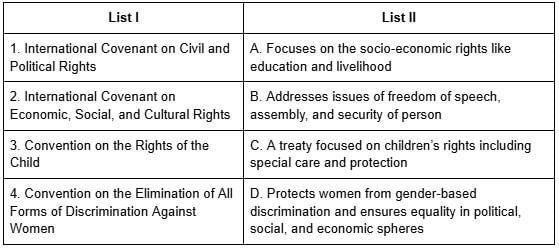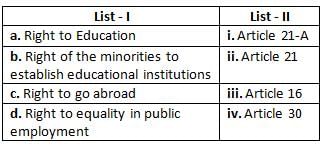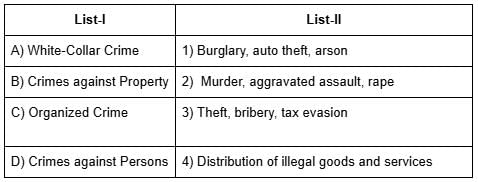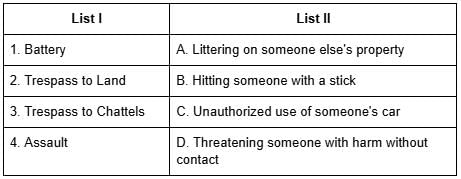Legal Studies: CUET Mock Test - 3 - Humanities/Arts MCQ
30 Questions MCQ Test - Legal Studies: CUET Mock Test - 3
Indian Constitution empowers the Supreme Court to frame its rules for regulating the practice and procedure of the court. Which article of the constitution provides for the same?
Directions: Consider the statements and choose the correct answer.
(A) The President can appoint a duly qualified person as an additional judge of the High Court on the recommendation of the CJI.
(R) Appointment of additional judge is made due to temporary increase in business of house.
(A) The President can appoint a duly qualified person as an additional judge of the High Court on the recommendation of the CJI.
(R) Appointment of additional judge is made due to temporary increase in business of house.
In view of Doctrine of Judicial Review, which of the following are true?
- It is the basic structure feature of Indian Constitution.
- The power of judicial review can be curtailed through constitutional amendment.
- It tests the constitutionality of legislative acts.
Directions: In this question, one or more principle(s) is/are given and is/are followed by fact(s). Read the principle(s) carefully and apply it/them to the given fact(s) and choose the most appropriate option.
Principle 1: Whoever, intending to take dishonestly any movable property out of the possession of any person without that person's consent moves that property in order to such taking, is said to commit theft.
Principle 2: Whoever, being in any manner entrusted with property or with any dominion over property, dishonestly misappropriates or converts to his own use that property or dishonestly uses or disposes of that property in violation of any direction of law prescribing the mode in which such trust is to be discharged or of any legal contract, express or implied, which he has made touching the discharge of such trust or wilfully suffers any other person so to do, commits criminal breach of trust.
Facts: Ramlal, going on pilgrimage to Ayodhya, entrusts his gold plate to Arunesh, the keeper of a warehouse, till Ramlal shall return. Arunesh carries the plate to a goldsmith and sells it.
Q. What offence has been committed by Arunesh, if any?
Match the types of human rights treaties with their focus areas:

Assertion (A): In an inquisitorial system, the judge takes centre stage in dispensing justice.
Reason (R): The judge determines facts and issues in dispute.
Gopal is a neighbour of Pankaj. Gopal hangs wet clothes on his balcony and the dripping water spoils the clothes of Pankaj. This situation leads to a fight between the two. How can the dispute be best resolved between the two parties?
'The state of Nature has a law of Nature to govern it, which obliges everyone and reason, which is that law, teaches all mankind who will but consult it, that being all equal and independent, no one ought to harm another in his life, health, liberty or possessions.' This is a quote by
Match List - I with List - II and select the correct answer with the help of codes given below:

Directions: The question consists of two statements, one labelled as Principle(s) and the other as Facts. You are to examine the Principle(s) and apply it/them to the given Facts carefully, and select the best option.
Principle: No person attending any educational institution recognised by the state or receiving aid out of state funds shall be required to take part in any religious instruction that may be imparted in such institution or to attend any religious worship that may be conducted in such institution or in any premises attached thereto unless such person or, if such person is a minor, his guardian has given his consent thereto.
Facts: Junaid was a boy of a Muslim family and son of Mr. Ajiz Khan. He went to the school nearby called St. Barbosa. The school had predominantly the students coming from the Christian religion. In the morning assembly, the students were asked to sing hymns of Bible and other Christian literature praising Lord Jesus. Junaid was reluctant to do so, and he was punished for that. His father sued the school.
On what ground(s) can the National Commission for Minorities refuse to admit a complaint?
The functions of a State Bar Council includes:
A. Organising legal aid
B. Regulating the content and syllabus of the law degree
C. Determining the cases of misconduct against advocates
Which of the following is/are true with respect to enrolment as an advocate in India?
I. The person must possess LLB degree from an Indian University.
II. The person must be at least 21 years of age.
III. A foreign national cannot be enrolled as an advocate in India under any circumstances.
Under the amended rules of the Bar Council of India, which of the following information can be put up by the advocates on their chosen websites?
Assertion (A): India has ratified the International Covenant on Civil and Political Rights.
Reason (R): International Covenant on Civil and Political Rights contains an explicit provision for legal services.
With reference to State Authority, which of the following statements is/are incorrect?
1. It is the duty of the State Authority to give effect to the policies and directions of the Central Authority.
2. The State Authority is entrusted with the responsibility of appropriate allocation of funds to the District Authorities.
Identify the correct statements:
(A) Public Interest Litigation (PIL) has been used to address socio-economic rights and political reforms.
(B) PIL is always adversarial in nature.
(C) PIL allows for citizen and representative standing.
(D) PIL is restricted to only environmental cases.
The customary international law of treaties was codified in the
Which of the following statements is/are true with regard to International Court of Justice?
I. It is the main judicial branch of the United Nations.
II. It has jurisdiction only in cases where parties voluntarily seek its assistance.
Rama and Bose agreed to an arbitration trial. On conclusion of the arbitration trial, Rama was awarded to indemnify Bose with Rs. 50,000 by the end of February 2020. During February 2020, Rama refused to pay Bose the said amount. Rama in defence said that the arbitration agreement was not in written form and hence doesn't bind him to indemnify Bose. Is the plea by Rama valid?
Which of the following statements would the author mostly agree with?
According to the passage, what is a necessary component to enable arbitration between parties in a dispute?
Chand was alleged by Suraj on the acquisition of his house in Delhi which was decided to be dealt under the Arbitration Act. The arbitrator asked Chand to submit his statement within a month. Chand failed to submit his statement within the stipulated time. The arbitrator terminated the proceedings on account that Chand failed to submit the statement. Is the termination valid?
What are the main attributes that arbitration should possess to be an alternative to litigation?
Assertion (A): A Supreme Court judge is appointed by the President.
Reason (R): There should be minimum interference of the executive body.
Which of the following is not required in a gift?
In law of Tort, unliquidated damages are always awarded. The meaning of unliquidated is
________ made while in the custody of police is inadmissible.





















